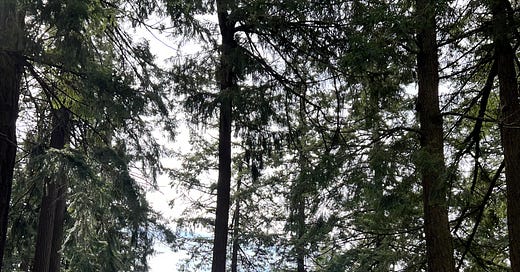Photo by the author
There’s a park in my neighborhood that’s an old volcano—or, more precisely, a dormant cinder cone of the Boring Lava Field. It’s covered with beautiful tall trees and paths wind around its base. At the top it flattens out and on one side there’s a view into downtown Portland. On the other, if it’s clear, you can see a ridge in the far distance, and Mt. Hood. The scent of Douglas fir and hemlock is strong at the top, because there’s almost always a breeze. No matter what my mood is when I’m at the base of Mt. Tabor, by the time I’ve walked up its sides and felt the age difference between myself and its trees, my moods, my thoughts, have diminished into quiet.
I was on Mt. Tabor last week and as I walked around the circular path at its top I saw the little hemlock in the picture at the top of this post. I had an instant fondness for it, propped between two helpful sticks, guiding it up towards its neighboring trees. Because the tree is shorter than I am, I felt a kinship to it. What will it take for this small tree to survive? What will it need to learn?
These are my questions, for myself. When I think about the responsibilities humans have at this moment, both to our communities and to the ecosystems of which we are a part, I feel like that hemlock, in proportion to those trees. That’s when the phrase “It’s ok to be a beginner” came into my head. It felt like an answer, a balm to my worried self.
One of the many reasons I ended up leaving academia is that I’m an interdisciplinary thinker and it’s difficult to feel a sense of belonging or value in academic institutions unless you’re a specialist. I understand the impulse to go deep in a small area, to give oneself a better sense of certainty about the subject one studies. Yet it has seemed to me that there are some problems, like patriarchy, violence, white supremacy, or ecosystem destruction, that demand both a braiding together of multiple knowledges and a translation of theoretical and specialized language into a vernacular that calls to non-specialists to join in.
What “counts” as expertise? Is it lived experience? Is it identity? Is it credentials, certifying the hours and years we’ve spent reading and communing with an idea? Is it institutional standing and publications? Is it the capacity to receive and send energy where it is most needed? Is it the ability to move and excite others? Is it the capacity to channel information outside the logic and rationality of the mind? Is it embodied knowing?
So much of what the dominant culture ratifies as expertise is rooted in a very narrow definition of professional specialization. If being a credentialed professional lets you charge money for your services, marks you as “better than” others and thus worthy of high fees, then knowledge acquisition is about separation and hierarchy and the elevation of “rationality” above other sources of knowledge.
I can only be an expert in something if I draw my boundaries very narrowly around what it is that I am supposed to know, and if others agree that this boundary makes sense to them. There is a consensus about where an area of interest begins and ends, and there are exams and practices that label and evaluate the separation of the knower from the object that is examined, the knower from those who are not as skilled in that knowledge. There’s nothing necessarily wrong with any of these approaches to knowledge—after all, I don’t want my neighbor who is fascinated with plants to be trying on neurosurgery for a day if I have brain cancer.
What I’m mulling over is the way this singular definition of expertise has come to be a stand-in for all forms of knowing. If I assume that mastery of a field is possible and necessary, then I may be skeptical of partial knowledges, hesitations, questions and ambiguities, hunches and intuitions, dreams and visions. If I hear a spoken word piece and the hair stands up on my forearms and I feel seen in a way I never have, is that a “feeling,” separate from a thought? Can I solve a problem with that feeling?
To me this is not a theoretical discussion. These definitions have real world consequences. They exclude entire communities from the arena of credibility. Sometimes it is appropriate for beginners to attend, listen, take in the wisdom of elders and say almost nothing back. But I wonder how many people tell themselves they have nothing to offer to the complex problems we are facing as a collective because they don’t have the training, the expertise, the theoretical sophistication or the credentials to play.
When I was in graduate school for the first time, someone asked me if I’d read a book. I was excited—I’d never heard of the book the person referenced. I asked him eagerly to tell me why I should read it, and to say more about it. He answered me, and then he told me that I should never again admit that I hadn’t read a book when I was asked. I was in my first semester of a years-long graduate program, and I was told to pretend I already knew everything, in order to be taken seriously. He was dead serious and, I think, correct in his advice. (He also told me to wear my glasses instead of my contacts, and to put my hair up and out of sight, which says a lot about what an “intellectual” person looks like.)
What happened after this encounter was that I stopped paying attention to any form of knowledge that wasn’t ratified by those who had power over me. I thought I was making a good choice in doing so. I didn’t even think I was giving something up. I just thought I would finally be taken seriously, finally have a voice, if only these people would let me in the club. It took years before everything I had ignored crested like a wave and took me down and then I had to lie there, panting, trying to figure out what I’d missed along the way.
The fragmentation of being into mind and body, feelings and thoughts, masculine and feminine, is a strategy to push away what is threatening and embrace the fiction that we can attain some kind of transcendent mastery over something. It’s a great distraction from the terror of death and dissolution. It’s a particularly Western phenomenon. For me, when I think about how I was taught to learn, I remember how I was encouraged to see myself as separate from the world, below those who knew more, and only worthy of speaking if I had something absolutely new to add to what was already there.
I think about how I was set up to objectify myself and the external world, to objectify “nature” and see myself as not that, and how cruel that was, because it made me hate and deny the parts of myself that were weak, and vulnerable, and that didn’t have a fast answer to a complex problem.
It wasn’t until much later that I learned about the Zen concept of beginner’s mind and how treasured that state is; how difficult it is to stay there. I like to think of all knowledge as partial and transient, and of all of us as having something to bring forward, no matter who might say we aren’t credible, or that we don’t look the way a person should look, we don’t talk the right way, or we don’t belong in the room. I hope if you’re catching your breath, thinking of speaking but then holding it, that you won’t stop yourself next time.
Thanks, and take good care of yourselves out there this week!
xo
Rebecca
Please note: I’m working on another project in the background that’s requiring a bit more time than I currently have, and so I’m going to temporarily move this newsletter to an every-other-week schedule. I’ll see you in two weeks!












Share this post